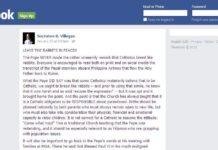NEARLY two years after being elected Pope, Francis has earned worldwide acclaim for his pastoral approach to Church and social issues, earning him titles such as the “People’s Pope” and “Reformer” of the Catholic Church.
However, media reports continue to claim that the Church under Pope Francis is relaxing its stance on headline issues such as homosexuality, atheism, and the science of evolution, using the Pope’s own words.
For Fr. Conegundo Garganta, executive secretary of the Catholic Bishops’ Conference of the Philippines (CBCP)-Episcopal Commission on Youth, media’s propensity to quote the Pope out of context should serve as reminders to Catholics to be more knowledgeable about the Church’s teachings, to avoid misinterpretations.
‘Who am I to judge?’
Pope Francis was said to have changed Church teachings on homosexuality, after addressing a question about the “gay lobby” in the Vatican.
“If someone is gay and is searching for the Lord and has good will, then who am I to judge him?” Pope Francis said in a press conference aboard a flight back to Rome after the celebration of the 29th World Youth Day in Rio de Janeiro, Brazil, on July 29, 2014.
However, Pope Francis was actually pointing out that homosexuals should be respected and not marginalized, referring to the Catechism of the Catholic Church (CCC).
“The problem is not having this tendency, no, we must be brothers and sisters to one another,” he said.
The Church is against “homosexual acts,” not “homosexual people and orientation,” the CCC states. The CCC further explains that homosexual people must be accepted with respect, compassion, and sensitivity.
“Every sign of unjust discrimination in their regard should be avoided. These persons are called to fulfill God’s will in their lives,” it states.
This was echoed by Fr. Dave Clay, CBCP-Episcopal Commission on Family and Life assistant executive secretary, who reiterated that the Catholic Church does not condemn gays and lesbians.
“The Church has no problem with gays and lesbians. We are not going to condemn them. We are here to help,” Clay said in a previous interview with the Varsitarian.
Opposing homosexual acts and same-sex marriage only means respect for the “true meaning” of marriage, he added.
“Not allowing them to get married is not discrimination. It is not God’s plan for two men or two women to get married,” Clay said. “If two men or two women want to be together and live together as a couple, it is up to them. But I’m not going to call it a marriage.”
‘God’s mercy has no limits’
Aiming to reach out to atheists and non-believers, Pope Francis wrote an open letter to La Repubblica, an Italian daily, in response to the questions of its atheist editor, Eugenio Scalfari.
According to Pope Francis, God does not condemn those who do not believe and do not seek faith, but is inviting them to ask for forgiveness.
“God’s mercy to humanity has no limits, if he who asks for mercy does so in contrition and with a sincere heart,” Pope Francis said in the letter last Aug. 7.
After this statement was published by the Italian daily, headlines like “Pope Francis says atheists who do well are redeemed, not just Catholics,” and “Pope lets atheists off the hook,” appeared in various online publications.
But Garganta said the Pontiff’s remarks should not be misinterpreted as if Pope Francis was liberalizing Church doctrines, because the statements were actually based on the catechism.
“When Pope Francis gave the statement, I can affirm that he is coming from a wealthy pastoral experience that is basically supported by his knowledge of the Word of God,” Garganta said.
He added that Pope Francis’ statement on atheists should not be interpreted as a way of being saved, noting that even a baptized Catholic should recognize Jesus as a savior to be saved.
“Those are selective interpretations. One can perceive that doing one good action is enough, but it is not. This salvation is based on a relationship of knowing God,” Garganta said.
Science and Religion
Following an address to the Pontifical Academy of Science in Rome last Oct. 28, Pope Francis was again accused of beginning another revolution on Catholic doctrine.
This was after Pope Francis claimed that the theory of evolution and the Big Bang Theory, which was proposed in 1927, do not contradict the divine act of creation. Rather, “it requires it.”
The Big Bang Theory, hypothesized by Jesuit priest Georges Lemaitre, states that the universe was born after a cosmic explosion about 13 billion years ago and has evolved since.
According to the Pontiff, belief in both the creation theory and the theory of evolution are consistent with the Catholic faith, noting that God should not be regarded as a “magician,” who could make everything possible by waving a wand.
“Evolution in nature is not inconsistent with the notion of creation because evolution requires the creation of beings that evolve,” Pope Francis said. “When we read about Genesis, we run the risk of imagining God as a magician. But that is not so. He created human beings and let them develop according to the internal laws that He gave to each one so they would reach fulfilment.”
According to Cardinal Mar Alencherry, head of the Syro-Malabar Catholic Church, the Pope’s statements on the origin of universe did not break any Catholic belief because it has long been affirmed in Humani Generis, an encyclical written by Pope Pius XII in 1950.
“Neither the theories on evolution nor Big Bang Theory stands against the teachings of the Church as far as the faithful is concerned,” Alencherry said in a statement. “He just explained that God created living and non-living beings and let them develop according to God’s internal laws.”
Article 36 of the 1950 encyclical states that there is no conflict between the dogma of the Catholic Church and the theory of evolution, provided that Catholics believe that the human soul was created by God.
Alencherry added that despite numerous attempts to interpret evolution at different times, there is no doubt that the origin of the universe and man is God.
Challenge to the faithful
During the first anniversary of his papacy, Pope Francis clarified the misinterpretations brought about by the mainstream press, noting that he was not about to change Catholic doctrines.
“The object is not to change the doctrine, but it is a matter of going into the issue in depth and to ensure that the pastoral ministry takes into account the situations of each person,” the Pope said in an interview on March 5, 2014 with Corriere della Sera, an Italian news agency.
Garganta reminded the faithful of the importance of knowing the faith. “There really is a challenge for a Catholic to know his faith, so we need to learn it. We should not always depend on what a bishop or the Pope says,” he said. “The challenge for all of us is that when someone comes to us, there is an expectation that we will be able to give an answer to questions about faith.” Angeli Mae S. Cantillana









